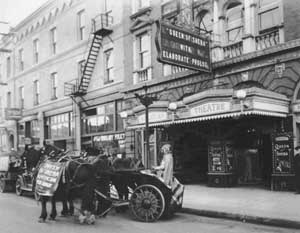On December 13, 1902, the Beck Theater in Bellingham, located at 1310 Dock Street (now Cornwall), opens for business with the comic opera Foxy Quiller. The theater, built by Jacob Beck (1856-1915), seats 2,200 and quickly becomes the city's finest entertainment venue.
Jacob Beck was born in Germany and immigrated to the United States in 1870, at the age of 14. After a stint in the coalmines of Pennsylvania, Beck arrived in Whatcom County in 1882, shortly after his marriage to Mary Peters. Within a decade, he became one of Bellingham's wealthiest and most notable developers.
Beck put up almost everything he owned to build his namesake theater, which took two years and nearly $150,000 to complete. Designed in a Louis XIV style, with a predominantly red and gold interior, the exterior was fashioned in Chuckanut sandstone. The seating capacity was 2,200.
Interest in the new theater was such that opening night seats were sold to the highest bidder, a move that netted Beck a reported $25,000 that evening. Gallery seats, normally the cheapest in any house, went for $1.50 apiece, while box seats averaged $100. Certain prime locations went for as high as $1,500 per seat.
By 1913, the Beck Theater had fallen on hard times, and was presenting small-time vaudeville productions. In 1915, the venue underwent a change when the entire upper balcony was removed and a projection booth installed, whereupon the theater began showing motion pictures as its main attraction. It was at that time that the house was renamed the American. (Interestingly, the change forced Jim Warwick, hired in 1902 as the stage manager for the Beck Theater, to learn a new trade. Warwick became the American's first projectionist, a post he held until the mid-1950s.)
In 1960 the Beck family sold the American for slightly more than its original cost. The building was razed and a pair of department stores erected on the site.

